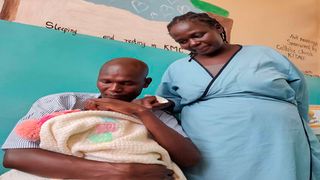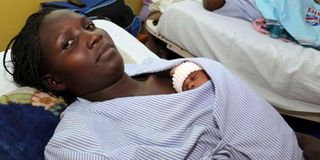
Mr Enock Kosgei and his wife Felistas Chepkemoi look lovingly at their newborn son wrapped on his chest at a private room for fathers providing Kangaroo Mother Care at Kitale County Referral Hospital on October 5.
| Moraa Obiria | Nation Media GroupWhy Kitale men are warming up to Kangaroo Mother Care
Enock Kosgei fondly holds his son on his chest. He is sitting on a chair in a blue-walled room with a drawing of a father providing Kangaroo Mother Care (KMC).
Below the drawing is the message “Father’s turn for KMC”. KMC is skin-to-skin care for pre-term infants. For the past 29 days, Mr Kosgei has spent eight hours in this room in the children’s wing of Kitale County Referral Hospital relieving his wife. Their baby was 1,200 grammes when it was born, far below the normal 2,500 grammes for a term baby.
At this weight, its nervous and respiratory functions are very weak. The body parts are not fully developed to support these functions, neonatal nurses at the facility explain. The skin, for instance, is very thin to hold warmth to support feeding and breathing. Under KMC, a child has to be on skin-to-skin care for at least 20 hours and is expected to gain 20 to 30 grammes every 24 hours.
KMC is a low-cost but innovative method recommended by the World Health Organization (WHO) for saving babies born alive before 37 weeks of pregnancy. Those extremely pre-term babies are born at less than 28 weeks, very pre-term (28 to 32 weeks) and moderate to late preterm (32 to 37 weeks). They would be born at low birth weights of less than 2,500 grammes or very low weights of less than 1,500 grammes, while others are delivered at extremely low birth weights of less than 1,000 grammes.
Childcare responsibilities
This care was first introduced in Kenya in 2014 by the Ministry of Health with help from Save the Children, a child rights international organisation. Bungoma was the first county to adopt it. Now, 40 counties are practising it. This pre-term baby care has demystified the cultural order that rested all the childcare responsibilities on the mother. It is turning fathers into active co-partners proportionately sharing in the unpaid work. The UN Women's Generation Equality campaign calls for equal sharing of unpaid care and domestic work. Mr Kosgei expresses his satisfaction in providing his fair share of responsibility.
“I decided on my own to do this and I am happy I am helping my wife,” he says. He proudly says his son’s weight has increased to 1,730 grammes. It was not difficult for him to embrace KMC. He often accompanied his wife to antenatal visits. “I would see drawings (of father providing KMC) and wonder, ‘would this be true?’” he says.
So, when the nurse informed him that his help was needed, he was more than ready to do it. His wife, Felistas Chepkemoi sits on the bed next to him.
“I can stretch my legs when he is around and that helps me relax,” she says as they smile at each other. It is the same feeling for Christine Muhindi, whose husband has for the past one week been commuting from Ortum in West Pokot to relieve her for five to six hours daily.
“His physical and emotional support is very important to me. It makes me feel comfortable and we can both focus on the growing of the baby,” the happy mother says from the bedside opposite Ms Chepkemoi’s. Their daughter was 1,600 grammes when she was born. Her husband Michael Muhindi was at first shaken when the nurse introduced him to the idea.

Nurses at the Kangaroo Mother Care Unit at Kitale County Referral Hospital.
“In my head, I asked myself, ‘will I manage?’” he says. But then, he thought to himself: “This is my child and I loved her very much. I can do this.” Now, he is in full delight when his wife hands him the precious little one to continue with the care.
“I don’t find it hard at all. I’m so happy to support my wife to care for our daughter,” says the proud father with a broad smile. He adds that KMC has made him bond with his daughter. “It has made me feel that I am a good father and a complete person,” he says.
At one week, the neonatal nurses at the facility say their daughter should have acclimatised to the outside environment and should start gaining weight. As such, it has not gained weight yet.
The child feeling the parents’ love, keeping it safe from infections that would arise from incubator-based care and saving parents the torture of being separated from their newborns are all benefits of KMC, say the neonatal nurses. This is in addition to saving the parents related costs. In a private hospital, Mr Kosgei and his wife would have accrued not less than Sh300,000 in hospital bills. Kitale Referral being a public hospital, the charges are covered under the free maternity scheme, Linda Mama. These parents must be here until the babies are 2,000 grammes. Ruphus Kevogo, a nurse attached to the newborn unit and KMC, says only babies who are at least one kilogramme and without feeding and breathing complications are put on KMC.
She says they only release parents whose babies have gained 2,000 grammes. They are allowed to continue providing the skin-to-skin care at home. Then, the child is strictly monitored for two years with neonatal nurses visiting the babies at home.
“The babies whose mother and father take turns to provide the care gain weight quickly,” she says.
A 2009 study on Kangaroo Mother Care, home environment and father involvement in the first year of life, concluded that the care intervention could be an excellent means to ensure parents’ mature involvement in the future of their children. Trans Nzoia County Reproductive Health Coordinator Betty Khaemba says the county records 20-30 pre-term babies a month. The number reflects referrals from sub-county hospitals and neighbouring counties.
Kitale Referral is the only hospital now offering a full-fledged KMC. She says Endebess Sub-County Hospital plans to start the programme. The hospital adopted KMC in 2017 and 700 babies have gone through KMC since, out of which 400 fathers have actively participated in providing the care, she says. The hospital started with one bed and has increased to nine, including two in the separate room for fathers.
Parents are prepared thoroughly to undertake KMC. During the training period, the baby would be put in an incubator. They are allowed to provide KMC once they prove to have got hold of it. How to get the fathers into KMC is part of the training that the health workers receive? Save the Children Project Specialist Teresa Akun says training health workers is critical to uptake of KMC among fathers.

Getrude Juma sleeps with her new born baby at the Kangaroo Mothers Care unit in Busia County Hospital.
She says that in the 18 counties where they have helped public, private and faith-based health facilities introduce KMC, emphasis on fathers' involvement has been central but there is still a lot of sensitisation needed to change traditional patterns on child care.
In Bungoma, Trans Nzoia and Busia counties, fathers are encouragingly shedding archaic customs but in Kisii and Nyamira counties, men need more time to see things from a different lens. Ms Akun says that in these counties men “cannot even hold their babies”, but with “continuous sensitisation they will certainly change”.
Dr Caroline Mwangi, head of the neonatal and child health division at the Health ministry, says the KMC guidelines and training manuals that they developed in collaboration with Save the Children have enabled the ministry to scale up this kind of childcare.
She observes that KMC has helped in reducing neonatal mortality as prematurity is a leading cause of deaths among newborns.
In 2014, the neonatal mortality rate was 23.1 per 1,000 live births, which has now declined to 21, data from World Bank shows. This is against an average global rate of 17 deaths per 1,000 live births based on figures from United Nations Children’s Fund.
Further, the Healthy Newborn Network lists intrapartum-related events as a leading cause of neonatal deaths in Kenya at 29 per cent, followed by pre-term birth complications (28 per cent) and sepsis and tetanus (16 per cent).
Evaluate progress
Save the Children offers the Ministry of Health, through the division of neonatal and child health, technical and financial support to enable the counties to initiate KMC. These include training health workers and supporting it to monitor and evaluate progress of implementing KMC in the respective counties.
In Trans Nzoia County, it supported the training of 19 health workers and according to Dr Rachel Inginia, county paediatrician, they seek to empower all others in sub-county hospitals.
She says in the next 10 months, the county will have expanded KMC facilities since the World Bank has supported the county to build a mother and baby hospital.
While efforts are being made to enable fathers to appreciate the role of childcare, health experts say until pregnant couples adopt health-seeking behaviours and are free from daily socio-economic pressures, Kenya will still record a high number of pre-term babies.
“Women, especially from poor households, deliver preterms. They go into early labour since they strain so much to work to provide for themselves and their families,” says Dr Inginia. Back in the room with Mr Kosgei, his conclusion was:“Men need to know taking care of a child is the responsibility of both parents. They should therefore play the role very well.”
As the world celebrates World Prematurity Day on November 17, whose theme is: “Zero separation: Act now! Keep parents and babies born too soon together”, perhaps it will be an apt time for fathers to reflect on his words.





